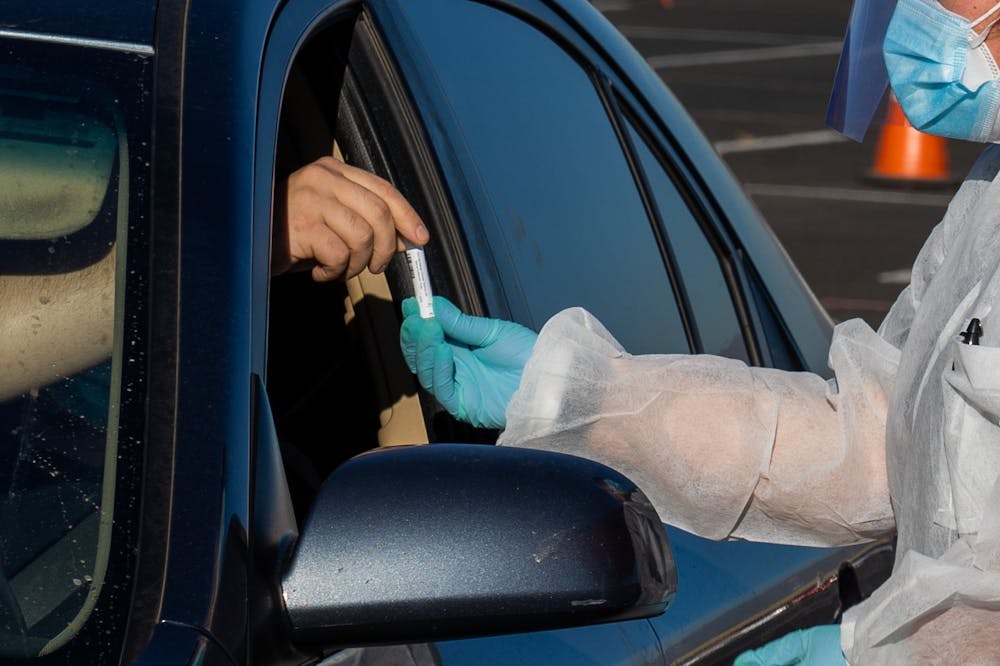On the first day of the Spring 2021 semester, ASU reported its second-highest number of active COVID-19 cases since the pandemic began.
The University reported a total of 900 active coronavirus cases within its community, an increase of 219 cases since Thursday, according to an update Monday. This trails the University's highest number of reported active cases of 983 on Sept. 3. The fall semester began with 161 active cases.
Active cases among students increased by 200 since Thursday to 728 total and active cases among employees increased by 19 to 172.
There are 674 active cases among students off campus in the metropolitan Phoenix area and 41 students are isolating on the Tempe campus. A total of 13 active student cases are on the Downtown Phoenix, West or Polytechnic campuses.
ASU has reported 5,180 cumulative cases since Aug. 1, according to the update. Since Thursday’s update, cumulative cases have increased by 287 among students and increased by 39 among employees.
Meanwhile, data from the Centers for Disease Control and Prevention shows Arizona has the second-highest rate of new COVID-19 cases per 100,000 people in the country.
Internal tracking of ADHS ZIP code data where ASU campuses are located — 85281, 85004, 85306 and 85212 along with the 85282 ZIP code in Tempe — done by The State Press shows cumulative cases have increased by 6,546 since the last day of the fall semester.
There were 3,644 combined new cases reported between Tempe's 85281 and 85282 ZIP codes since Dec. 4. The 85212 ZIP code, where the Polytechnic campus is located, reported 1,788 new cases. The 85004 ZIP code, where the Downtown campus is located reported 260 new cases. The 85306 ZIP code, where the West campus is located, reported 854 new cases since Dec. 4.
Arizona reported 8,995 new cases and six deaths Monday, bringing state totals to 627,541 total cases and 10,147 deaths, according to the state health department's data dashboard.
The University has collected approximately 197,831 tests from students and employees since Aug. 1. According to the update, ASU has tested approximately 60% of on-campus students and 8% of off-campus students since Jan. 1.
In an email Friday, University President Michael Crow announced that required random testing will be increased to 25% for on-campus students and employees each week.
The ASU community's percent positivity rate is roughly 2.6%, using the cumulative number of positive results as the numerator and the total number of tests collected as the denominator.
READ MORE: Analyzing ASU's COVID-19 trends throughout the fall semester
Monday marks the first day ASU faculty teaching in person this semester are eligible to receive the COVID-19 vaccine, as a part of Phase 1B of Maricopa County’s vaccine plan.
Phase 1B includes education and childcare providers, law enforcement, adults over the age of 75, adults living in congregate settings and essential workers along with Phase 1A populations, according to the county's website.
Crow wrote that hundreds of ASU employees have already been vaccinated as part of the county’s 1A Phase of vaccine distribution, which included those working in COVID-19 health care or testing laboratory support roles.
In an emailed video message Monday, Crow said he is unsure when vaccines for students will be available, but is focused on the community and "moving forward."
While thousands of students were infected last semester with the virus, Crow described last semester as "successful" in Monday's video.
"We're all taking responsibility for eachother," Crow said. "We do that by masking, by social distancing, by testing when you're asked to test, by doing your daily health check, by engaging in helping others through everything."
ASU is starting the spring semester in the same learning and housing modes in which fall semester ended: Instruction can be delivered in-person, through ASU Sync or iCourses and students can still live in University housing where no external visitors can enter and communal spaces will be monitored.
Despite rising case counts at the University and statewide, ASU "will continue to do all we can to enable students and faculty to engage in-person, following all public health protocols," a University spokesperson wrote in an email Monday.
READ MORE: ASU will encourage faculty to teach in person for spring semester
Over the weekend, the ASU Community of Care Coalition and United Campus Workers of Arizona, a new union of ASU faculty, sent a letter urging the University to return to remote work until the spread of the virus falls below 5% or until students and employees required to be on campus are fully vaccinated.
Their letter also asks students living in residence halls, near campus and attending in-person classes receive a PCR test at least once a week. It asks for more racially sensitive counseling at no or reduced cost, for spring break to be reinstated and for transparency in any decisions made related to virus mitigation.
“ASU has an opportunity to lead by example, to center Black, Indigenous, and people of color, those with disabilities, and marginalized people as the way forward in mitigating the harms of the COVID-19 virus,” the groups wrote. “To be a true community of care, ASU must center these needs in order to justly, and innovatively, put this mitigation plan into action.”
On Jan. 26, the University’s Undergraduate Student Government is hosting a blood drive at the Desert Financial Arena in Tempe in collaboration with Vitalant, a nonprofit that provides blood products and services to hospitals, surgical centers and emergency treatment facilities.
All donations made through the blood drive will include a free COVID-19 antibody test.
Editor's note: Due to an error in the University’s COVID-19 Management Strategy and Data Update, a previous version of this article incorrectly stated the number of cumulative test results the University has collected from students and employees since Aug. 1. The article was updated Jan. 15 at 5:15 p.m. to reflect the change.
Reach the reporter at kkwilso5@asu.edu and follow @kaceywilson_ on Twitter.
Like The State Press on Facebook and follow @statepress on Twitter.




